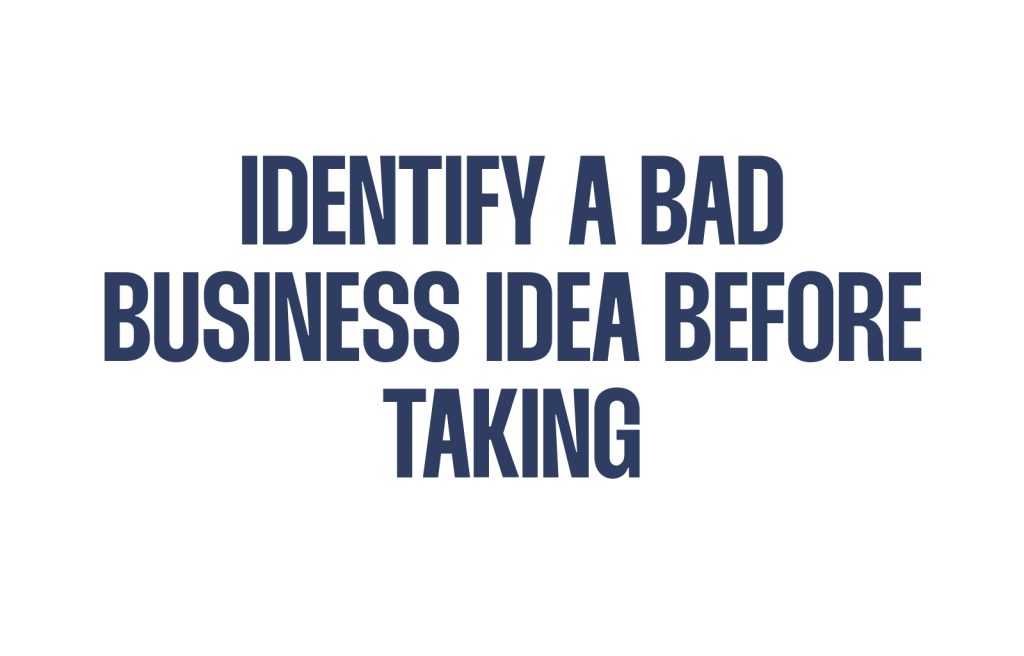How to Identify a Bad Business Idea Before Taking the Plunge

Identify a Bad Business Idea
Every entrepreneur dreams of starting a successful business, but not every opportunity is right for everyone. It’s crucial to evaluate a business idea thoroughly before investing time, money, and effort into it. In this article, we will explore the signs that indicate a business may not be the right fit for you, regardless of its apparent potential. By considering these factors, you can save yourself from embarking on a venture that may not align with your goals and strengths.
Embarking on a business venture is an exciting endeavor, but not all ideas are destined for success. It is crucial to thoroughly evaluate a business opportunity before investing your time, money, and effort into it. In this comprehensive guide, we will delve deeper into the signs that indicate a business may not be the right fit for you, regardless of its apparent potential. By carefully considering these factors, you can save yourself from pursuing a venture that may lead to disappointment and financial setbacks.
Excessive Minimum Requirements
Every business carries a certain level of risk, but some require substantial initial investments and logistical complexities. For instance, businesses like physical stores, restaurants, or pharmacies often demand significant capital, licenses, and extensive setup procedures. However, even after fulfilling these requirements, success is not guaranteed. It is essential to weigh the potential returns against the demands of the business and consider whether it aligns with your capabilities and resources.

Case in Point
The Eco-friendly Packaging Company Opportunity Imagine being presented with an opportunity to start an eco-friendly packaging company. Although it may seem promising given the growing demand for sustainable solutions, the venture would require substantial investments in specialized machinery, raw materials, and distribution channels. Recognizing that this particular venture required more capital and logistical expertise than I possessed, it became clear that it wasn’t the right fit for me.
Time Commitment and Lifestyle Impact
Launching and running a successful business often demands a significant amount of time and effort. Some ventures require round-the-clock dedication, leaving little room for personal pursuits or work-life balance. Assess whether the time commitment aligns with your desired lifestyle and if you’re willing to make the necessary sacrifices to bring the business to fruition. Be honest with yourself about your capacity to commit and the impact it may have on your overall well-being.
Lack of Differentiation and Changing Customer Habits
In a highly competitive market, standing out from the crowd is crucial for success. If your business idea fails to offer a unique value proposition or fails to adapt to changing customer habits, it may struggle to gain traction. Evaluate whether your business idea has a distinctive element that sets it apart and whether it can keep up with evolving customer preferences. Without differentiation and adaptability, your venture may become obsolete in the face of emerging trends and competitors.
Limited Scalability Without External Support
Some businesses heavily rely on the founder’s continuous involvement or require constant external support to achieve scalability. If a business can only expand by consistently hiring additional staff or partnering with external entities, it introduces complexities in terms of human resource management, cost structures, and long-term sustainability. It’s important to evaluate whether the scalability potential aligns with your growth objectives and whether you have the necessary skills to manage these dynamics effectively.
Challenges in Establishing a Strong Brand Identity
Building a strong brand is crucial for standing out in a competitive market and creating customer loyalty. However, certain business ideas face inherent limitations when it comes to brand-building opportunities. Factors such as intense market competition, limited product differentiation, or lack of unique value propositions can hinder the development of a distinct brand identity. Without a compelling brand, marketing efforts and customer acquisition become increasingly challenging.
Time-Intensive Operations with Limited Returns
If a business demands a significant amount of time and effort from the founder without proportional financial rewards, it can lead to burnout and hinder personal growth. Evaluating the trade-off between time commitment and financial returns is crucial for ensuring a healthy work-life balance and long-term sustainability. If a business idea requires an excessive time investment that outweighs the potential rewards, it may be worth considering other opportunities that provide a better balance.
Failure to Address Existing Market Habits and Preferences
For a business to thrive, it must address existing consumer habits and preferences, providing a compelling reason for customers to switch from their current choices. Failing to understand customer needs, market dynamics, and pain points can limit the potential success of a business idea. Thorough market research and an understanding of customer behavior are vital for developing a value proposition that resonates and drives customer adoption.
and this is how you can Identify a Bad Business Idea.
Here are the 20 bite-sized takes on How to Identify a Bad Business Idea Before Taking the Plunge:
- Evaluate thoroughly before diving into any business opportunity.
- Carefully consider your goals and strengths before starting a business.
- Excessive capital and logistical complexities may not align with your capabilities.
- Balance time commitment and work-life balance when starting a business.
- Stand out in a competitive market with a unique value proposition and adaptability.
- Be aware of the complexities introduced by ventures relying heavily on external support.
- Some ideas may face limitations in differentiation for building a strong brand identity.
- Find a healthy balance between time commitment and financial rewards.
- Understand customer needs and adapt to existing habits and preferences.
- Thorough market research is crucial for developing a value proposition.
- Consider the proportional financial rewards for the time and effort invested.
- Assess if the potential returns outweigh the demands of the business.
- Failure to address existing market habits can limit the success of a business idea.
- Building a distinct brand identity requires differentiation and unique value propositions.
- Assess scalability potential and your ability to manage associated complexities.
- Not every opportunity is suitable for everyone—align skills, resources, and aspirations.
- Avoid wasting time and effort on ventures that don’t align with your goals.
- Thoroughly evaluate compatibility with your skills and resources.
- Don’t solely rely on initial appeal or industry trends—assess various factors.
- Align passions and strengths with viable opportunities for long-term success.
Conclusion
Before diving headfirst into a new business venture, it’s essential to thoroughly evaluate its potential for success. By considering factors such as capital requirements, scalability, branding opportunities, time commitment, and customer habits, you can gain valuable insights into the viability of your business idea. Remember, not all opportunities are suitable for everyone, and it’s crucial to align your skills, resources, and aspirations with the demands of the venture. With a thoughtful and informed approach, you can avoid wasting time and effort on ventures that aren’t the right fit for you. Make informed decisions and set yourself up for entrepreneurial success.
When considering a new business opportunity, it’s crucial to conduct a thorough evaluation of its compatibility with your skills, resources, and aspirations. Simply relying on initial appeal or industry trends is not enough. By carefully assessing factors such as capital requirements, scalability potential, brand-building opportunities, time commitments, and market dynamics, you can make informed decisions about whether a business idea is worth pursuing. Remember, aligning your passions and strengths with a viable opportunity is key to achieving long-term success in the ever-evolving business landscape. all these are necessary to Identify a Bad Business Idea.
Read more on our blog at pugo.studio and gain valuable insights into the world of business and entrepreneurship.
Find amazing niche opportunities 10x faster!
Are you tired of struggling to find the perfect business idea? Do you dream of diving into a niche that’s already validated and brimming with growth potential? Look no further! Nichejar is here to revolutionize your entrepreneurial journey.
Imagine a platform that takes the guesswork out of starting a successful business. Nichejar is your ultimate companion, empowering entrepreneurs and solopreneurs like you to discover validated business ideas that are ripe for success. Say goodbye to endless brainstorming sessions and uncertain ventures. With Nichejar, you can hit the ground running.

















